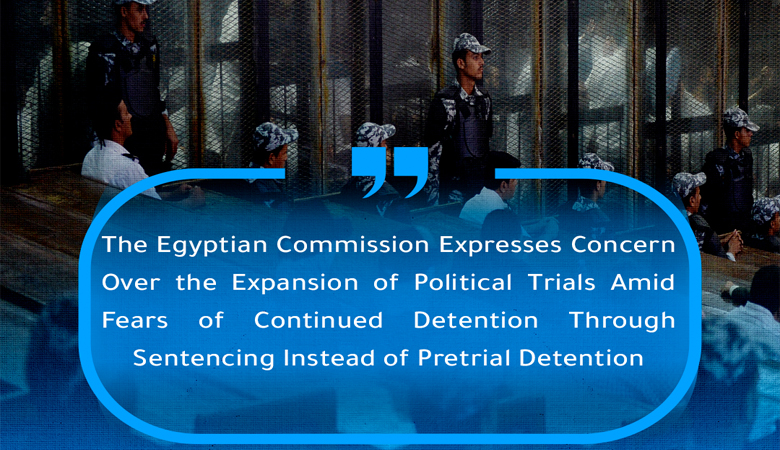The Egyptian Commission Expresses Concern Over the Expansion of Political Trials Amid Fears of Continued Detention Through Sentencing Instead of Pretrial Detention
Calls for the Immediate Release of Political Prisoners, Prisoners of Conscience, Journalists, and Human Rights Defenders, and for the Dropping of All Charges Against Them

The Commission Demands Fair Trials That Allow Prisoners to Speak About Years of Violations and Compensation for Their Periods of Detention
The Commission Publishes an Analysis of Cases, Categorizing Them by Year, Pretrial Detention Periods, and Their Distribution Between Terrorism Criminal Courts and Other Courts
Cairo: 5 Feb 2025
The Egyptian Commission for Rights and Freedoms expresses its deep concern over the increasing referrals of politically motivated cases to trial, rather than taking serious steps towards releasing prisoners as part of an effort to end prolonged pretrial detention without legal justification. This constitutes a clear violation of human rights and contradicts Article 9 of the International Covenant on Civil and Political Rights, which guarantees protection against arbitrary detention and ensures the right to a fair trial in line with international legal standards.
The Commission fears that these referrals to trial are being used to target activists, politicians, human rights defenders, and journalists. It calls for the immediate release of political detainees, prisoners of conscience, and human rights defenders facing trial, as well as the dismissal of all charges against them, especially those who have been recycled into new cases while still in detention. Furthermore, the Commission emphasizes the importance of ensuring fair and impartial trials for all those referred to court.
The increasing number of case referrals, particularly to terrorism courts, raises serious concerns about the fairness of judicial proceedings and reflects an ongoing disregard for calls to release political detainees, many of whom have already exceeded the legally mandated pretrial detention periods. This situation suggests that referrals to trial may be a new means of keeping political prisoners and prisoners of conscience in custody—this time through court rulings instead of extended pretrial detention. It is crucial, therefore, that these trials provide ample space for detainees to speak about the violations they have endured throughout their years of imprisonment.
The Egyptian Commission for Rights and Freedoms has documented the referrals of cases primarily investigated by the Supreme State Security Prosecution throughout 2024 and the first weeks of 2025. A total of 130 cases have been referred, with 95 cases transferred to trial in 2024 and another 35 since the beginning of this year. The Commission’s analysis covers case referrals dating back to 2017, aiming to highlight key trends in judicial referrals and shed light on the legal mechanisms involved, while emphasizing the need to uphold fair trial standards that respect human rights. These referrals come amid repeated calls to end prolonged pretrial detention and release individuals detained in politically motivated cases and freedom-of-expression cases. However, the authorities have responded by intensifying referrals to trial instead.
The Commission’s monitoring has revealed significant discrepancies between the initiation of investigations and case referrals to trial. Forty-three cases were referred within a period ranging from one day to two years after investigations began, while 78 cases took between three to five years before referral, and nine cases were only sent to trial after more than five years. These delays highlight one of the most severe legal violations detainees face—being held for longer than the two-year maximum period allowed under the law. The data also indicates slow judicial procedures, which negatively impact justice by prolonging litigation and infringing on detainees’ rights.
Regarding court classifications, 129 cases have been referred to criminal courts, while only one case has been transferred to an economic misdemeanors court. This demonstrates a pattern of classifying most cases as serious felonies, necessitating closer scrutiny of the nature of the charges and whether they align with such classifications.
The breakdown of cases by year is as follows: four cases from 2017, five from 2018, ten from 2019, 23 from 2020, 45 from 2021, 34 from 2022, five from 2023, and four from 2024. This data highlights a significant increase in referrals between 2020 and 2022.
According to the Commission’s statistics, a substantial number of human rights defenders, journalists, and activists have been referred to trial, facing charges related to joining or participating in a terrorist organization and spreading false news. While some have been released after years of detention, many remain in pretrial custody. Among the individuals whose cases have been referred are Egyptian Commission researcher Ibrahim Ezzedine, who was sent to trial after his release, as well as human rights lawyer Ibrahim Metwally, who has been detained for several years. Other notable detainees include translator Marwa Arafa, journalist Karim Ibrahim, TV cameraman Karim Salem, and photojournalist Hamdi Al-Zaim.
Commenting on his case referral, researcher Ibrahim Ezzedine stated: “My referral to trial in Egypt is further evidence that the regime is not satisfied with the violations I have already endured, including losing three years of my life in prison and being subjected to torture. Instead, it continues its repressive policies by using the judiciary as a tool to eliminate dissent. This trial is not just a legal procedure—it is part of a broader strategy to silence voices and intimidate activists and human rights defenders, even those dedicated to advocating for Egyptians’ economic, social, and cultural rights.”
He continued: “What is happening today is the continuation of a repressive system that does not tolerate any dissenting opinion, even when it calls for improved living conditions and social justice. Instead of listening to calls for reform, the regime responds with trials, restrictions, and imprisonment—confirming that political reform is not on its agenda. On the contrary, it is tightening its security grip over all aspects of life. These actions not only demonstrate an absence of any intention to reform but also reveal that the state is moving toward even greater authoritarianism, where silencing opposition is no longer enough; it seeks to erase it entirely in a desperate attempt to maintain control and strip citizens of any hope for change or justice.”
It is noteworthy that all cases with scheduled hearings will be reviewed by only two terrorism court circuits, with one additional circuit responsible for reviewing appeals. This expected backlog raises serious concerns about these courts’ ability to handle the growing number of cases, potentially leading to further delays and jeopardizing fair trial guarantees.
These statistics reflect a significant rise in judicial referrals and an expansion in the scope of cases transferred to terrorism courts, raising serious questions about the authorities’ commitment to addressing human rights and political demands for the release of political detainees. Additionally, concerns persist about the fairness of legal proceedings for those facing trial.
The Egyptian Commission for Rights and Freedoms reiterates its call for the Egyptian authorities to take urgent steps to close the file on pretrial detention and release all political detainees. It also emphasizes that ensuring justice and upholding the rule of law require putting an end to these violations, allowing citizens to exercise their political and civil rights without restrictions or persecution, and reviewing counterterrorism laws and procedures to ensure their compliance with fair trial standards and respect for human rights.





